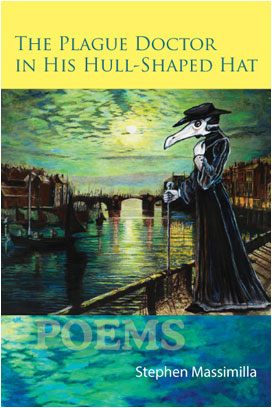nycBigCityLit.com the rivers of it, abridged


Reviews
Fall 2014 / Spring 2015
The Plague Doctor in his Hull-Shaped Hat by Stephen Massimilla

The
Plague Doctor in his Hull-Shaped Hat
by Stephen
Massimilla
Austin State University Press, 2013; 118 pages; $16.00
ISBN-10: 1622880072 / ISBN-13: 9781622880072; paper
http://www.stephenmassimilla.com/books.html
Reviewed by Ronnie Norpel
The evocative images in Stephen Massimilla's new poetry book,The Plague Doctor in His Hull-Shaped Hat, swirl like the clouds in Van Gogh's Starry Night. The vivid hues and sounds in this collection will inspire readers to make many connections and associations, sometimes without even realizing it. That Massimilla is a painter as well as a poet is no small matter: he knows just how much pigment to use and exactly where to place his self-ground colors.
Shades extracted from his poems become poems in themselves, making one want to visit the "cream-colored coves" and "peach-and-rose sunup" of "At Capri," to breathe under the "Sapphire sky" among "topaz lips" in the "citrine light" of Paris ("Even Plein-Air-ists"), and even to follow the speaker's schizophrenic sister past the "blue sheets of newsprint" through the New York "landscape of cut black tunnels" to "yellow, cottony flowers" ("About Sister").
We begin to realize that, cloaked and daggered unto themselves, these are love poems—to dear friends and relatives, to troubled outsiders, to marginalized mythic animals, and to longed-for destinations such as Capri, Sicily, Venice, Paris, New York, Marrakesh, and India. Some of the poems also seem to be addressed to a beloved. It hits us in "On the Benefits of a Philosophy Degree," where, in the first section, the speaker gives himself a pep talk of sorts over their parting, but by the end of the second section, he realizes he's been fooling himself and asks, "What has already become of me / if something this terrible were to happen?"
The poems are characterized by clever word play and bi-directional associations: word-image, image-word. In the poem "No Longer A Night Girl," we are told of an American stranger in an Italian city: "Lovely enough to bring down a fortress, she arrests / an officer in midstride…" The writer teases us with the sexiness of the girl in fishnets; we feel how the words themselves seem to long for her. Yet, by embodying a language barrier, she remains out of the policeman's (and our) reach: "As he extends / directions, Who asked you anyway? she word- / lessly blurts.../ She's an open / book in a language he doesn't speak."
Just as we can only read his words, neither can the writer himself make physical contact with the world he creates and describes. Yet Massimilla has painted something very much alive. As Van Gogh said, "I dream my painting and I paint my dream." The painterly images in these poems are beautiful, and it is good to keep one's reader curious, intrigued, dreaming even; but Massimilla keeps us also wishing for more—a more straightforward, more revelatory storyline. What exactly happened? It is not always easy to tell, despite how the poems feel like they fit together to tell a linked story.
The Plague Doctor as a whole remained for me a distant masterpiece of mysterious, painterly word play, until I heard Stephen Massimilla read at an event here in New York. Hearing his poems in his own voice added twinkling facets to the jeweled images, and his pacing made the familiar bells of love and loss ring ever clearer. In the end, it was revealed that one of the events informing the narrative wasn't just another break-up: a beloved friend he was writing about had died—of her own volition. It is difficult when one we love dies, unimaginably worse to lose someone—for the beloved to die—while the love itself is still very much alive. And it's none of our business, but we've been gifted these poems: loss is the plague which neither the doctor nor we can fix. But Massimilla has word-painted his way forward in living color.
The Plague Doctor in His Hull-Shaped Hat was selected in the Stephen F. Austin State University Press Poetry Series Prize competition. You can find it at www.amazon.com or www.stephenmassimilla.com
Ronnie Norpel is the host and producer of the eclectic variety show TRACT 187 CULTURE CLATCH, featuring poets, prosers, actors, comedians, singers, tap dancers, hula hoopers, and musicians, gigging bi-monthly on the Upper West Side since Feb. 2011.